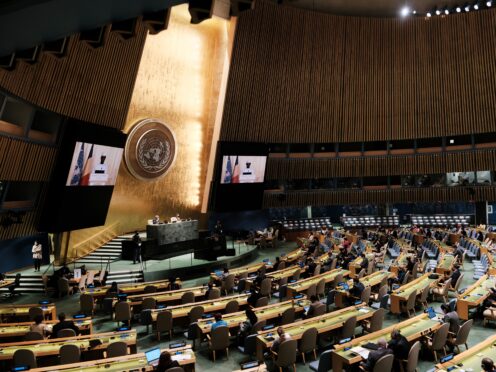African politicians whose countries have little or no access to coronavirus vaccines have called for help from richer nations at the United Nation’s annual meeting of world leaders.
Some called for member states to relax intellectual property rights in order to expand vaccine production.
“The virus doesn’t know continents, borders, even less nationalities or social statuses,” Chad’s president Mahamat Idriss Deby Itno told the UN General Assembly in New York.

“The countries and regions that aren’t vaccinated will be a source of propagating and developing new variants of the virus.
“In this regard, we welcome the repeated appeals of the United Nations secretary general and the director general of the (World Health Organisation) in favour of access to the vaccine for all. The salvation of humanity depends on it.”
The struggle to contain the coronavirus pandemic has featured prominently in leaders’ speeches over the past few days — many of them delivered remotely because of the virus.
Country after country acknowledged the wide disparity in accessing the vaccine, painting a picture so bleak that a solution has at times seemed impossibly out of reach.
South Africa’s president Cyril Ramaphosa pointed to vaccines as “the greatest defence that humanity has against the ravages of this pandemic”.

“It is therefore a great concern that the global community has not sustained the principles of solidarity and cooperation in securing equitable access to Covid-19 vaccines,” he said.
“It is an indictment on humanity that more than 82% of the world’s vaccine doses have been acquired by wealthy countries, while less than 1% has gone to low-income countries.”
He and others urged UN member states to support a proposal to temporarily waive certain intellectual property rights established by the World Trade Organisation to allow more countries, particularly low- and middle-income countries, to produce Covid-19 vaccines.
Angola president Joao Lourenco said it was “shocking to see the disparity between some nations and others with respect to availability of vaccines”.
“These disparities allow for third doses to be given, in some cases, while, in other cases, as in Africa, the vast majority of the population has not even received the first dose,” Mr Lourenco said.
The US, Britain, France, Germany and Israel are among the countries that have begun administering boosters or announced plans to do so.

Namibia president Hage Geingob called it “vaccine apartheid”, a notable reference given the country’s own experience with apartheid when neighbouring South Africa’s white minority government controlled South West Africa, the name for Namibia before its independence in 1990.
Benido Impouma, a programme director with the WHO’s Africa program, noted during a weekly video news conference that the surge in new Covid-19 cases is starting to ease in Africa “but with 108,000 new cases, more than 3,000 lives lost in the past week and 16 countries still in resurgence, this fight is far from over”.
“Fresh increases in cases should be expected in the coming months,” Mr Impouma said. “Without widespread vaccination and other public and social measures, the continent’s fourth wave is likely to be the worst, the most brutal yet.”
